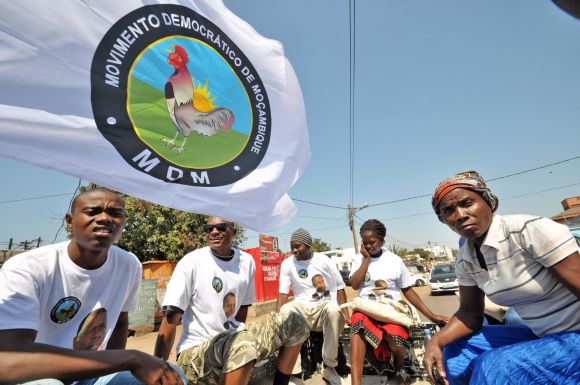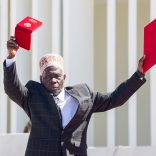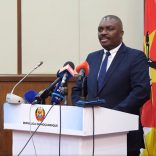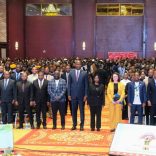Indian Navy’s First Training Squadron arrives at Maputo port, Mozambique
Third Mozambican party sweeps investigation into hidden debts, demands punishment

Lusa (File photo)
The MDM, the third-largest political party in Mozambique, believes that the conclusions of the parliamentary inquiry into the debt scandal served only to meet the deadline imposed and demands to know the final destination of US$1.5 billion involved, calling for the punishment of the members of the previous government involved.
“It is a report drawn from an exacerbated romanticism resulting exclusively from the objective of fulfilling a timetable, and a mere act of protocol laid before the international community and the Bretton Woods institutions,” the parliamentary group of the Mozambique Democratic Movement (MDM) says in a document that Lusa has access to.
The MDM says that the conclusions of the Parliamentary Commission of Inquiry (CPI) into the hidden debts is “deprived of any content that could serve as a pedagogy in the effectively accountability of deviant acts in the governance and management of the common property and heritage of Mozambicans”.
Concerning accountability, the MDM, represented by a single MP in a commission dominated by the Mozambican Liberation Front (Frelimo) and boycotted by Renamo, the largest opposition party, says that the conclusions of the document “are too hesitant, romantic and elusive”, and calls for the previous government to be held accountable.
The MDM maintains that the executive, then led by Armando Guebuza, failed to comply in matters of sovereignty with the Constitution in contracting illegal debts to companies in 2013 and 2014, and, in the case of the head of state, as commander-in-chief of the Forces of Defence and Security.
“We do not agree that only the finance minister of the previous government is directly responsible because his signature is on the state guarantee in favour of the three companies”, the MDM says.
In light of the law, it says, parliament should not target the former finance minister and current deputy Manuel Chang, and “should hold the government accountable”, arguing that the issue of guarantees on matters of sovereignty is the responsibility of the council of ministers and that, in a semi-presidential, centralised and concentrated executive, the head of government is responsible.
Among various recommendations, the MDM says that the Public Prosecutor’s Office and other judicial bodies must not only investigate the crime itself, but also search out and confiscate the assets of those responsible, freeze their bank accounts, assets and holdings in financial companies, and “immediately open the processes for their criminal, civil and administrative accountability” and calls for “the preventive arrest of those who are most suspected”.
On the US$2.2 billion Ematum, Proindicus and MAM loans, the opposition party’s statement argues that “most of the funding was directed to purposes unrelated to its social project, and most likely to war “in what it suggests to be” a transnational context of illegal arms trafficking”.
According to the MDM, “How US$1.5 billion was spent, no-one can say”. The party advises the population not to accept “phantom liabilities” and “not pay even a ‘quinhenta’ [half a metical] of any odious and criminal debts”.
The MDM also accused Frelimo of having “taken over the work of and converted the CPI into an order [encomenda],” noting that its proposals to call Armando Guebuza and the current head of state, Filipe Nyusi, as minister of defence at the date of the contracts, to parliament, were received “in with extremely hostile and almost obsessive reluctance”.
Guebuza’s unexpected appearance came “two days after the end of the Commission’s work and in relation to other payers heard”, and prompted members of the majority to come out in their “unofficial defence”, alleging that requests from the opposition crossed over into the “state security area”.













Leave a Reply
Be the First to Comment!
You must be logged in to post a comment.
You must be logged in to post a comment.